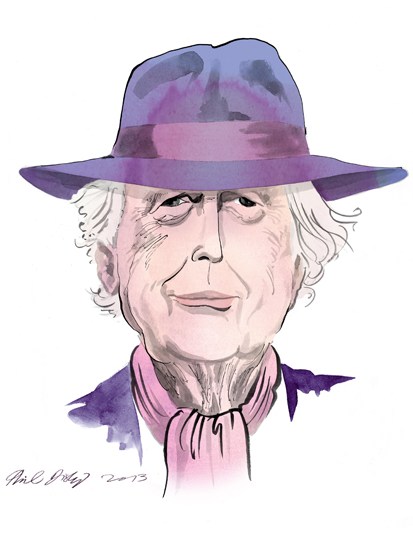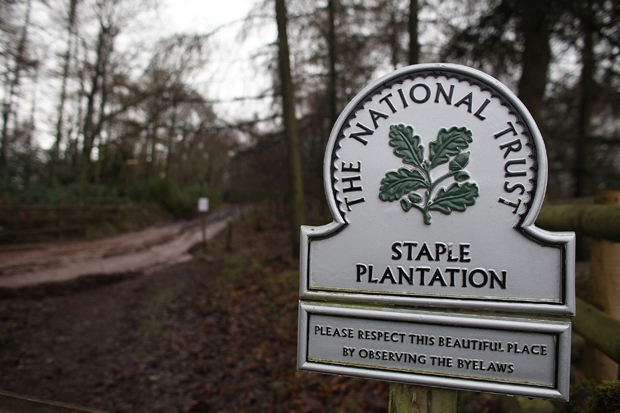Sir Peregrine Worsthorne isn’t much looking forward to his 90th birthday on 22 December. ‘It’s awful,’ he cries. ‘It makes me so angry Diana Athill writing about the joys of old age. My eyes, teeth, heart — everything starts to go. Keeping alive becomes a full-time job. I’m so lucky to have a much younger wife. If I was on my own, I’d crumble. But as they say, it’s better than the alternative.’
Worsthorne is speaking in the high Gothic drawing room of the old rectory in Hedgerley, Buckinghamshire, where he lives with his second wife, the architectural writer Lucy Lambton. Over lunch, he says to Lucy, ‘My brain isn’t working!’ His brain seems highly functional to me, as he reels off anecdotes going right back to the 1920s. The former editor of the Sunday Telegraph, and a journalist since 1946, Worsthorne has been at the heart of things since his pre-war childhood, when his stepfather, Montagu Norman, was Governor of the Bank of England. He still remembers Lord Reith’s rage at being sacked as Director-General of the BBC in 1938. Reith heard the news in Worsthorne’s parents’ house. ‘He was at dinner when we turned on the radio to find Churchill had sacked him. He was absolutely furious, beside himself with rage. Churchill hated Reith because during the General Strike he wouldn’t allow him to harangue the public about not siding with the strikers.’
Worsthorne has remained the Zelig of the age into the 21st century, keeping a close eye on modern Conservative politics. He once saw the return of the English gentleman in David Cameron. But no longer. ‘The gentleman has gone,’ he says. ‘Cameron fits into that gentlemanly tradition but he’s very embarrassed and awkward about it. I only met him once at a fundraising thing at Stoke Park, a stately home near here. Lucy asked if he would mind her taking a photograph of him and me. He said he wouldn’t mind. He looked round and said, “My God, not with this background.” We stood in front of a tree or something. To be ashamed of that side of our national life is very sad.’
Worsthorne has little time for John Major’s shock at a public school elite, either. ‘Major missed the point entirely,’ he says. ‘There’s always going to be an elite. It seems to me that the Conservative party should say that private schools are in the national interest. It isn’t unfair — that is our system of producing authoritative leadership and authoritative institutions. Public schools are our historic, traditional producers of a governing elite, who see it as their responsibility to go into politics and to govern. That’s what they’re brought up to do, and their families have developed skills in doing it, in many cases.
‘Public schools have abandoned the idea of the gentleman. It must be inevitable that we’ll get rid of the private schools: it’s too crazy to have a system in which the public schools shy away from their very justification.’ Although Worsthorne still votes Conservative, he thinks old-fashioned Conservatism was killed off by Mrs Thatcher. ‘It’s a bit of a mystery why she gave me a knighthood — I was never a Thatcherite. She was a very dangerous kind of saviour. She was absolutely stupendous at winning the miners’ strike and the Falklands war. But she was a terrible bore — and she wasn’t a Conservative at all. The moment I realised something was going wrong, from the English Conservative point of view, was when I was having dinner with Alfred Sherman [one of her senior advisers]. I asked him if he would die for Mrs Thatcher. He said, “Die for Mrs Thatcher, Perry? I’d kill for Mrs Thatcher.” That wasn’t the Conservative voice — that was a fascist voice. There were a lot of very unhealthy people around her. The great thing about the Tory party, when it’s functioning properly, is a sensitive understanding of the psychology of the British people.
‘She hated the unions, she hated the Labour party. She saw them as enemies of the state. There was always a group of the Tory party like that, but they were very seldom in control.’
Worsthorne has few sacred cows. He certainly didn’t think much of C.S. Lewis, his tutor at Magdalen College, Oxford, during the war. Worsthorne was an undergraduate at both Oxford and Cambridge; he began at Peterhouse, Cambridge, before a training injury with the Oxfordshire and Buckinghamshire Light Infantry led to a term at Oxford. He also served in Phantom, Montgomery’s special reconnaissance unit, alongside ‘very jolly people’, including David Niven and Michael Oakeshott, the philosopher.
‘Lewis was absolutely useless, totally bored. He writes in his memoirs that his war work was to teach students who were not in the least interested. He said it was a more painful time than anything he suffered in the first world war. John Betjeman was quite right — he was a very bad tutor.’
After nearly 70 years as a journalist, he now has little reverence for his trade, either. ‘It shouldn’t be left to the journalistic profession to look after its own affairs. At the moment, it’s suffering from the great delusion that disclosure is its job. There is no longer any glimmering recognition of its responsibility — almost nothing is sacred.’ He says all this in his amused, fluting voice, happy to talk openly about anything. Like the time he was seduced at Stowe, on the art-room chaise-longue, by George Melly. ‘It was a very innocent kind of embracing. He denied it on the grounds that he was two years younger than me. I said it was well-known that the young often seduce the old, not the other way round. It long escapes me who was responsible for the hand going round. There was a correspondence about it in the TLS.’
Or the time in 1973 when he was the second man, after Kenneth Tynan, to say ‘fuck’ on British television. ‘There’s a possibility it wasn’t spontaneous. Apparently I took advice about it before in El Vino’s. I don’t remember. To the best of my knowledge, it was the mot juste.’
Together with his dandyish clothes, it’s hard not to think that the public persona is something of a joke, the tease of the outsider on the inside, with the oddest of conventional backgrounds. He has no childhood memories of his father, Alexander Koch de Gooreynd, a banker of Belgian extraction, who renamed himself Worsthorne after a village on his mother-in-law’s Lancashire estate. Worsthorne’s mother married Montagu Norman when Worsthorne was nine, and he didn’t meet his father properly until a party after the war.
‘At the party, a woman said to my father, “Do you know this young man, Perry Worsthorne?” He said, “No, I don’t actually know him, but we’ve got a lot in common.”
Did this unconventional upbringing at the heart of the establishment turn him into a contrarian tease? ‘Contrarianism is what Conservatism does. It hasn’t got an ideology. We are people who instinctively know the right thing to do. We don’t look it up in a book. A bit of it is pure contrarianism, too — the pure pleasure and enjoyment of annoying people. Surely we all have a bit of that?’
Got something to add? Join the discussion and comment below.
Get 10 issues for just $10
Subscribe to The Spectator Australia today for the next 10 magazine issues, plus full online access, for just $10.
You might disagree with half of it, but you’ll enjoy reading all of it. Try your first month for free, then just $2 a week for the remainder of your first year.














Comments
Don't miss out
Join the conversation with other Spectator Australia readers. Subscribe to leave a comment.
SUBSCRIBEAlready a subscriber? Log in